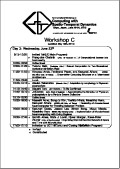|
Invited Talks | ||
|
| ||
|
RIKEN Brain Science Institute (Wako, Japan) Chaos-driven Computing Structure on a Token-based Architecture | ||
|
University College London (London, UK) Protocells as Tools for Architectural Design Practice | ||
|
Hokkaido University (Sapporo, Japan) Reaction-Diffusion Computers on Semiconductors - A Legacy from Past Adventures - | ||
|
National Institute for Materials Science (Tsukuba, Japan) Massively Parallel Computing on a 3D Nano Brain: A Correlation between Design and Emergent Intelligence | ||
|
University of Glasgow (Glasgow, UK) Computing with Inorganic Cellular Systems | ||
|
1: University of California, Los Angels (Los Angels, USA) 2: National Institute for Materials Science (Tsukuba, Japan) Nano-Neuromorphic Physical Intelligence: Atom-Switch Synapses Embedded in Neuroplastic-like Dendritic Wiring | ||
|
Kobe University (Kobe, Japan) Ambiguity of Body and Space in Neighborhood Reveals Co-existence of Complete Coherence and Autonomous Perturbation in Flocks and Schools | ||
|
University College London (London, UK) University of Southern Denmark (Odense, Denmark) Protocells and Computing? | ||
|
The University of Tokyo (Tokyo, Japan) Consciousness, Unconsciousness and Mind Time | ||
|
University of the West of England (Bristol, UK) Approximating the Behaviour of Physarum polycephalum by a Particle Swarm Collective | ||
|
The University of Tokyo (Tokyo, Japan) Computing Optimal Decision by Intracellular Kinetics | ||
|
Hokkaido University (Sapporo, Japan) Robust Computation in Two-Dimensional Activation-Inhibition Field | ||
|
University of New Mexico (Albuquerque, USA) Motion, Computation and Behaviors of Molecular Spiders | ||
|
Waseda University (Tokyo, Japan) Adaptation by morphology in Physarum plasmodium | ||
|
| ||
|
PRESTO, Japan Science and Technology Agency (Japan) Physarum polycephalum makes optimal network - Modeling of the Adaptive Network of True Slime Mold - | ||
|
Tohoku University (Sendai, Japan) Orchestrating Large Degrees of Freedom - A Case Study with a Soft-bodied Amoeboid Robot - | ||
|
Timetable | |||
|
| |||
| |||
|
Contributed Talks | ||
|
RIKEN Advanced Science Institute (Wako, Japan) Scalability of Amoeba-based Neurocomputer for Traveling Salesman Problem | ||
|
Institute of Physical Chemistry PAN (Warsaw, Poland) Universal Computing Automata based on Excitable Chemical Medium | ||
|
| ||
|
University of Southampton (Southampton, UK) Organising Chemical Reaction Networks in Space and Time with Microfluidics | ||
|
| ||
|
RIKEN Advanced Science Institute (Wako, Japan) Maze Exploration by Two-dimensional Nonlinear Fabry-Perot Interferometer | ||
|
| ||
|
RIKEN Advanced Science Institute (Wako, Japan) Implementation of Microbe-based Neurocomputing with Living Euglena | ||
|
The University of Tokyo (Tokyo, Japan) Structure and Dynamics of Song Network | ||
|
Contributed Posters | ||
|
| ||
|
Bocconi University (Milan, Italy) New Evidences on Variable Selection with Stochastic Optimization Algorithms | ||
|
| ||
|
University of Electro-Communications (Tokyo, Japan) Design of Optimal Entrainment for Limit-Cycle Oscillators | ||
|
| ||
|
Xuchang University (Xuchang, China) A Spatio-Temporal Modelling of Quorum Sensing Involving Small RNAs in Vibrio Harveyi | ||

 Hiroyasu ANDO
Hiroyasu ANDO June 23-24, 2010
June 23-24, 2010
 Download
Download Antonio GARAGANO
Antonio GARAGANO